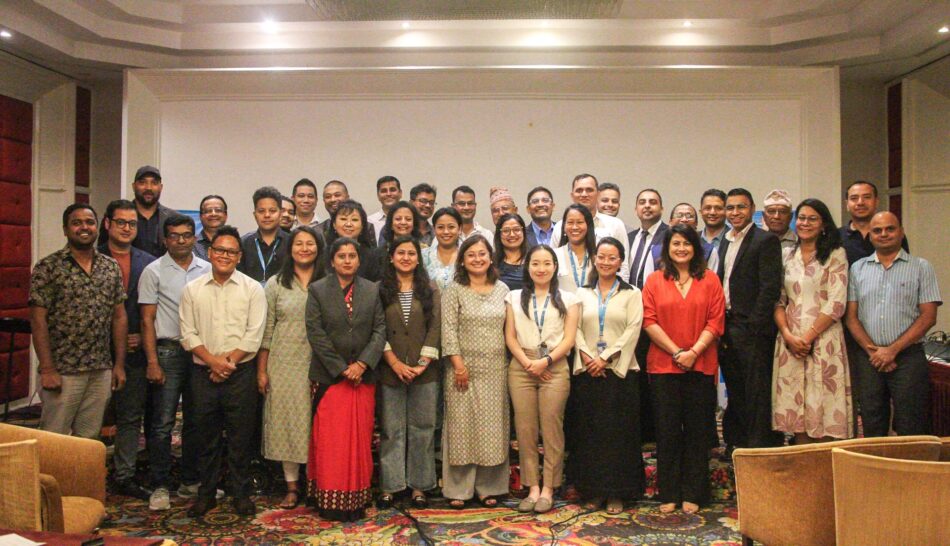
Kathmandu, Nepal – WaterAid Nepal (WAN) has successfully concluded the “Improvement of Hygiene Behaviors in Schools and Health Care Facilities” project, funded by the Japan International Cooperation Agency (JICA). Implemented in 14 schools and 15 healthcare facilities across Kalyanpur, Karjanha, and Mirchaiya municipalities in Siraha, this three-year project began in September 2021 and concluded in June 2024. The project was executed in collaboration with local municipalities, schools, healthcare facilities, and Bagmati Welfare Society Nepal (BWSN), ensuring basic inclusive water, sanitation, and hygiene (WASH) facilities.
A project dissemination workshop was held in Lalitpur district, highlighting the learnings, accomplishments, challenges, and findings of the IHBSH Project. The initiative aimed to improve hygiene behaviors through pilot activities, basic WASH facilities, and hygiene promotion activities, reaching approximately 3,433 students and 81 healthcare staff.
The project had three main components:
Construction and Renovation of WASH Facilities: Initial surveys identified gaps in WASH services. Inclusive infrastructures were built or renovated in schools and healthcare facilities.
Hygiene Behavior Change (HBC) Intervention: Formative research identified motivations and barriers to improving hygiene behaviors. HBC packages, developed based on this research, were pretested, revised, and delivered through creative, engaging sessions. Schoolteachers and healthcare staff received Training of Trainers (ToT) and subsequently conducted six HBC sessions over six months, supported by visual cues, nudges and hygiene promotion materials.
Research: Baseline surveys were conducted, followed by HBC session deliveries. Two monitoring surveys assessed students’ hygiene behaviors, with a cooling period after six months of intervention. End line surveys showed significant improvements in hygiene behaviors, with handwashing in critical moments increasing from 21% to 94% among students and from 9% to 83% among healthcare staff.
Major Achievements:
Basic Inclusive WASH Facilities: Child-friendly, gender-inclusive WASH facilities were constructed in 29 institutions, with trainings on their operation and maintenance provided to caretakers.
Behavior-Centered Design (BCD): The Assess, Build, Create, Deliver, and Evaluate (ABCDE) approach validated the project’s design principles as a proof of concept.
HBC Sessions: Significant improvements in hygiene behaviors were observed, including handwashing, drinking safe water, food hygiene, toilet cleaning, waste management, and menstrual health management.
The project demonstrated that WASH interventions, combined with hygiene behavior change promotion activities with creative HBC package and intervention, significantly improve hygiene practices. Stakeholder engagement was crucial for developing tailored HBC packages and ensuring project sustainability. This project’s success underscores the importance of data-driven strategies and the potential for replicating these interventions elsewhere.
Statements:
Gunjima Hinako, JICA Nepal Representative: “We are pleased to learn about the project’s findings and accomplishments in improving hygiene behavior.”
Bhola Prasad Pokharel, Mayor of Karjanha Municipality: “I am committed to sustaining the project’s accomplishments and sharing the learnings across other municipalities.”
Dr. Om Prasad Gautam, Senior WASH Manager-Hygiene of WaterAid UK: “Creative HBC package developed based on formative research and its intervention improves hygiene behavior of students and HCF staffs, which is the proof of concept, validated by the significant result of research through this project. WASH sector should learn and replicate this concept”
Sudarshan Neupane, Country Director of WaterAid Nepal: “We are committed to ensuring accessible and inclusive WASH facilities in collaboration with local government and partners. We have to use the learning of this project for the WASH sector and the country”
The workshop was attended by development partners, government officials, donor agencies, UN officials, and media. 